- Home
- Arthur Conan Doyle
The Adventure of the Devil's Foot
The Adventure of the Devil's Foot Read online
Produced by David Brannan. HTML version by Al Haines.
The Adventure of the Devil's Foot
By
Sir Arthur Conan Doyle
In recording from time to time some of the curious experiences andinteresting recollections which I associate with my long and intimatefriendship with Mr. Sherlock Holmes, I have continually been faced bydifficulties caused by his own aversion to publicity. To his sombreand cynical spirit all popular applause was always abhorrent, andnothing amused him more at the end of a successful case than to handover the actual exposure to some orthodox official, and to listen witha mocking smile to the general chorus of misplaced congratulation. Itwas indeed this attitude upon the part of my friend and certainly notany lack of interesting material which has caused me of late years tolay very few of my records before the public. My participation in someof his adventures was always a privilege which entailed discretion andreticence upon me.
It was, then, with considerable surprise that I received a telegramfrom Holmes last Tuesday--he has never been known to write where atelegram would serve--in the following terms:
Why not tell them of the Cornish horror--strangest case I have handled.
I have no idea what backward sweep of memory had brought the matterfresh to his mind, or what freak had caused him to desire that I shouldrecount it; but I hasten, before another cancelling telegram mayarrive, to hunt out the notes which give me the exact details of thecase and to lay the narrative before my readers.
It was, then, in the spring of the year 1897 that Holmes's ironconstitution showed some symptoms of giving way in the face of constanthard work of a most exacting kind, aggravated, perhaps, by occasionalindiscretions of his own. In March of that year Dr. Moore Agar, ofHarley Street, whose dramatic introduction to Holmes I may some dayrecount, gave positive injunctions that the famous private agent layaside all his cases and surrender himself to complete rest if he wishedto avert an absolute breakdown. The state of his health was not amatter in which he himself took the faintest interest, for his mentaldetachment was absolute, but he was induced at last, on the threat ofbeing permanently disqualified from work, to give himself a completechange of scene and air. Thus it was that in the early spring of thatyear we found ourselves together in a small cottage near Poldhu Bay, atthe further extremity of the Cornish peninsula.
It was a singular spot, and one peculiarly well suited to the grimhumour of my patient. From the windows of our little whitewashedhouse, which stood high upon a grassy headland, we looked down upon thewhole sinister semicircle of Mounts Bay, that old death trap of sailingvessels, with its fringe of black cliffs and surge-swept reefs on whichinnumerable seamen have met their end. With a northerly breeze it liesplacid and sheltered, inviting the storm-tossed craft to tack into itfor rest and protection.
Then come the sudden swirl round of the wind, the blistering gale fromthe south-west, the dragging anchor, the lee shore, and the last battlein the creaming breakers. The wise mariner stands far out from thatevil place.
On the land side our surroundings were as sombre as on the sea. It wasa country of rolling moors, lonely and dun-colored, with an occasionalchurch tower to mark the site of some old-world village. In everydirection upon these moors there were traces of some vanished racewhich had passed utterly away, and left as its sole record strangemonuments of stone, irregular mounds which contained the burned ashesof the dead, and curious earthworks which hinted at prehistoric strife.The glamour and mystery of the place, with its sinister atmosphere offorgotten nations, appealed to the imagination of my friend, and hespent much of his time in long walks and solitary meditations upon themoor. The ancient Cornish language had also arrested his attention, andhe had, I remember, conceived the idea that it was akin to theChaldean, and had been largely derived from the Phoenician traders intin. He had received a consignment of books upon philology and wassettling down to develop this thesis when suddenly, to my sorrow and tohis unfeigned delight, we found ourselves, even in that land of dreams,plunged into a problem at our very doors which was more intense, moreengrossing, and infinitely more mysterious than any of those which haddriven us from London. Our simple life and peaceful, healthy routinewere violently interrupted, and we were precipitated into the midst ofa series of events which caused the utmost excitement not only inCornwall but throughout the whole west of England. Many of my readersmay retain some recollection of what was called at the time "TheCornish Horror," though a most imperfect account of the matter reachedthe London press. Now, after thirteen years, I will give the truedetails of this inconceivable affair to the public.
I have said that scattered towers marked the villages which dotted thispart of Cornwall. The nearest of these was the hamlet of TredannickWollas, where the cottages of a couple of hundred inhabitants clusteredround an ancient, moss-grown church. The vicar of the parish, Mr.Roundhay, was something of an archaeologist, and as such Holmes hadmade his acquaintance. He was a middle-aged man, portly and affable,with a considerable fund of local lore. At his invitation we had takentea at the vicarage and had come to know, also, Mr. Mortimer Tregennis,an independent gentleman, who increased the clergyman's scantyresources by taking rooms in his large, straggling house. The vicar,being a bachelor, was glad to come to such an arrangement, though hehad little in common with his lodger, who was a thin, dark, spectacledman, with a stoop which gave the impression of actual, physicaldeformity. I remember that during our short visit we found the vicargarrulous, but his lodger strangely reticent, a sad-faced,introspective man, sitting with averted eyes, brooding apparently uponhis own affairs.
These were the two men who entered abruptly into our littlesitting-room on Tuesday, March the 16th, shortly after our breakfasthour, as we were smoking together, preparatory to our daily excursionupon the moors.
"Mr. Holmes," said the vicar in an agitated voice, "the mostextraordinary and tragic affair has occurred during the night. It isthe most unheard-of business. We can only regard it as a specialProvidence that you should chance to be here at the time, for in allEngland you are the one man we need."
I glared at the intrusive vicar with no very friendly eyes; but Holmestook his pipe from his lips and sat up in his chair like an old houndwho hears the view-halloa. He waved his hand to the sofa, and ourpalpitating visitor with his agitated companion sat side by side uponit. Mr. Mortimer Tregennis was more self-contained than the clergyman,but the twitching of his thin hands and the brightness of his dark eyesshowed that they shared a common emotion.
"Shall I speak or you?" he asked of the vicar.
"Well, as you seem to have made the discovery, whatever it may be, andthe vicar to have had it second-hand, perhaps you had better do thespeaking," said Holmes.
I glanced at the hastily clad clergyman, with the formally dressedlodger seated beside him, and was amused at the surprise which Holmes'ssimple deduction had brought to their faces.
"Perhaps I had best say a few words first," said the vicar, "and thenyou can judge if you will listen to the details from Mr. Tregennis, orwhether we should not hasten at once to the scene of this mysteriousaffair. I may explain, then, that our friend here spent last eveningin the company of his two brothers, Owen and George, and of his sisterBrenda, at their house of Tredannick Wartha, which is near the oldstone cross upon the moor. He left them shortly after ten o'clock,playing cards round the dining-room table, in excellent health andspirits. This morning, being an early riser, he walked in thatdirection before breakfast and was overtaken by the carriage of Dr.Richards, who explained that he had just been sent for on a most urgentcall to Tredannick Wartha. Mr. Mortimer Tregennis naturally went withhim. When he arrived at Tredannick Wartha he found an extraordin
arystate of things. His two brothers and his sister were seated round thetable exactly as he had left them, the cards still spread in front ofthem and the candles burned down to their sockets. The sister lay backstone-dead in her chair, while the two brothers sat on each side of herlaughing, shouting, and singing, the senses stricken clean out of them.All three of them, the dead woman and the two demented men, retainedupon their faces an expression of the utmost horror--a convulsion ofterror which was dreadful to look upon. There was no sign of thepresence of anyone in the house, except Mrs. Porter, the old cook andhousekeeper, who declared that she had slept deeply and heard no soundduring the night. Nothing had been stolen or disarranged, and there isabsolutely no explanation of what the horror can be which hasfrightened a woman to death and two strong men out of their senses.There is the situation, Mr. Holmes, in a nutshell, and if you can helpus to clear it up you will have done a great work."
I had hoped

 The Lost World
The Lost World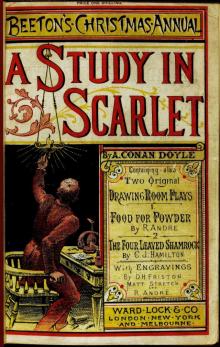 A Study in Scarlet
A Study in Scarlet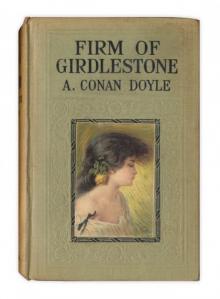 The Firm of Girdlestone
The Firm of Girdlestone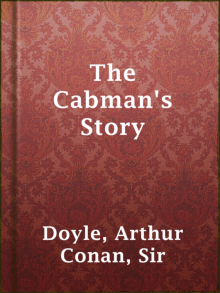 The Cabman's Story
The Cabman's Story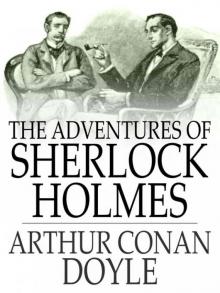 The Adventures of Sherlock Holmes
The Adventures of Sherlock Holmes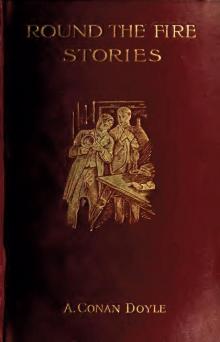 Round the Fire Stories
Round the Fire Stories His Last Bow: An Epilogue of Sherlock Holmes
His Last Bow: An Epilogue of Sherlock Holmes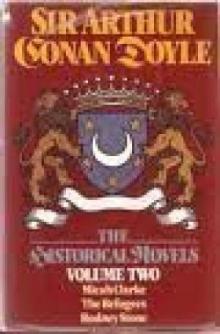 Micah Clarke
Micah Clarke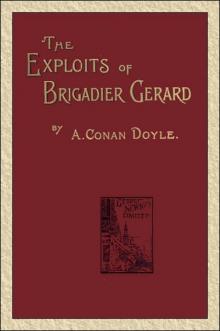 The Exploits of Brigadier Gerard
The Exploits of Brigadier Gerard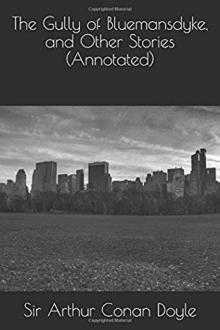 The Gully of Bluemansdyke, and Other stories
The Gully of Bluemansdyke, and Other stories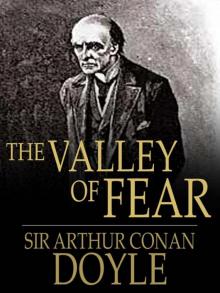 The Valley of Fear
The Valley of Fear The Last of the Legions and Other Tales of Long Ago
The Last of the Legions and Other Tales of Long Ago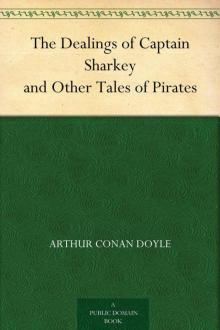 The Dealings of Captain Sharkey, and Other Tales of Pirates
The Dealings of Captain Sharkey, and Other Tales of Pirates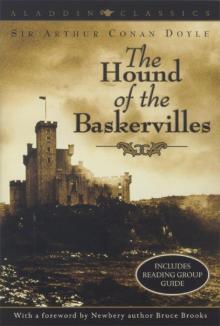 The Hound of the Baskervilles
The Hound of the Baskervilles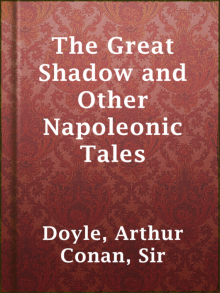 The Great Shadow and Other Napoleonic Tales
The Great Shadow and Other Napoleonic Tales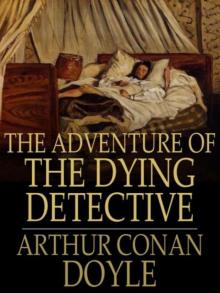 The Adventure of the Dying Detective
The Adventure of the Dying Detective The Man from Archangel, and Other Tales of Adventure
The Man from Archangel, and Other Tales of Adventure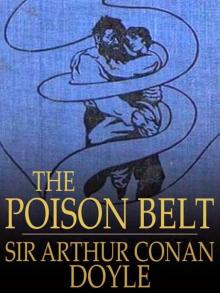 The Poison Belt
The Poison Belt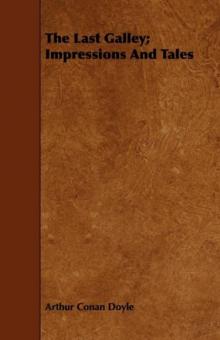 The Last Galley; Impressions and Tales
The Last Galley; Impressions and Tales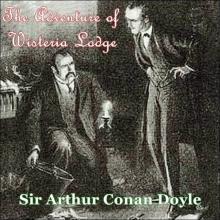 The Adventure of Wisteria Lodge
The Adventure of Wisteria Lodge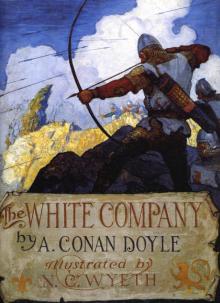 The White Company
The White Company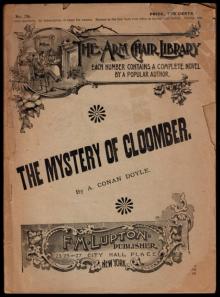 The Mystery of Cloomber
The Mystery of Cloomber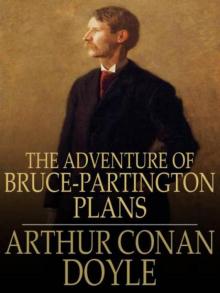 The Adventure of the Bruce-Partington Plans
The Adventure of the Bruce-Partington Plans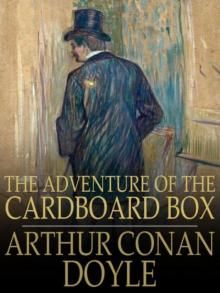 The Adventure of the Cardboard Box
The Adventure of the Cardboard Box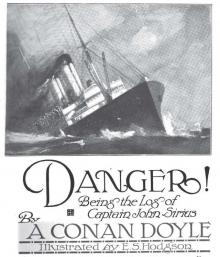 Danger! and Other Stories
Danger! and Other Stories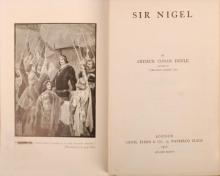 Sir Nigel
Sir Nigel The Return of Sherlock Holmes
The Return of Sherlock Holmes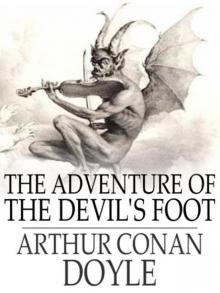 The Adventure of the Devil's Foot
The Adventure of the Devil's Foot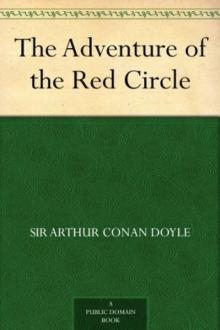 The Adventure of the Red Circle
The Adventure of the Red Circle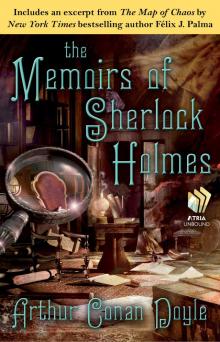 The Memoirs of Sherlock Holmes
The Memoirs of Sherlock Holmes The Adventure of the Yellow Face
The Adventure of the Yellow Face The Adventure of the Norwood Builder
The Adventure of the Norwood Builder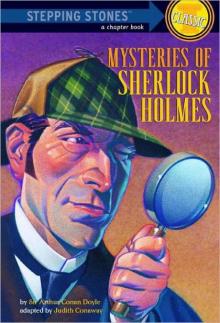 Mysteries of Sherlock Holmes
Mysteries of Sherlock Holmes The Adventure of the Missing Three-Quarter
The Adventure of the Missing Three-Quarter The Adventure of the Final Problem
The Adventure of the Final Problem A Scandal in Bohemia
A Scandal in Bohemia His Last Bow shssc-4
His Last Bow shssc-4 Beyond The City
Beyond The City The Adventure of the Gloria Scott
The Adventure of the Gloria Scott The Parasite
The Parasite The Land Of Mist pcs-3
The Land Of Mist pcs-3 The Adventure of the Musgrave Ritual
The Adventure of the Musgrave Ritual The Complete Sherlock Holmes, Volume I (Barnes & Noble Classics Series)
The Complete Sherlock Holmes, Volume I (Barnes & Noble Classics Series) The Adventure of the Stockbroker's Clerk
The Adventure of the Stockbroker's Clerk The Adventure of the Copper Beeches
The Adventure of the Copper Beeches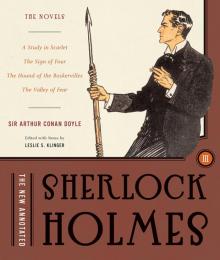 The New Annotated Sherlock Holmes
The New Annotated Sherlock Holmes When The World Screamed pcs-5
When The World Screamed pcs-5 The Adventure of the Six Napoleons
The Adventure of the Six Napoleons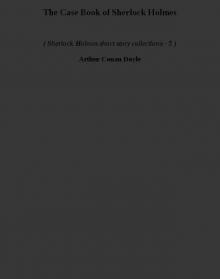 The Case Book of Sherlock Holmes shssc-5
The Case Book of Sherlock Holmes shssc-5 The Sign of Four
The Sign of Four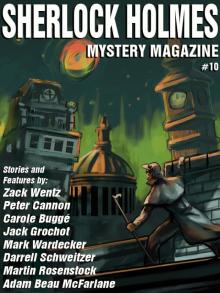 Sherlock Holmes Mystery Magazine #10
Sherlock Holmes Mystery Magazine #10 The Adventures of Brigadier Gerard
The Adventures of Brigadier Gerard The Adventure of the Second Stain
The Adventure of the Second Stain The Adventure of the Engineer's Thumb
The Adventure of the Engineer's Thumb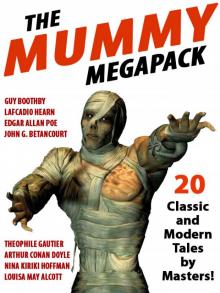 The Mummy Megapack
The Mummy Megapack The Disintegration Machine pcs-4
The Disintegration Machine pcs-4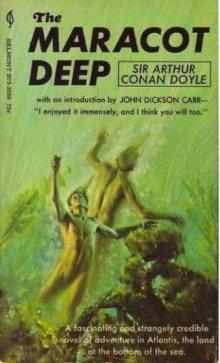 The Maracot Deep
The Maracot Deep The Five Orange Pips
The Five Orange Pips The Adventure of the Crooked Man
The Adventure of the Crooked Man The Adventure of the Blue Carbuncle
The Adventure of the Blue Carbuncle The Adventure of Silver Blaze
The Adventure of Silver Blaze The Adventure of the Solitary Cyclist
The Adventure of the Solitary Cyclist The Adventure of the Naval Treaty
The Adventure of the Naval Treaty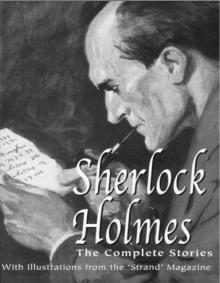 Sherlock Holmes. The Complete Stories
Sherlock Holmes. The Complete Stories The Adventures of Sherlock Holmes (sherlock holmes)
The Adventures of Sherlock Holmes (sherlock holmes) The Adventure of the Empty House
The Adventure of the Empty House The Narrative of John Smith
The Narrative of John Smith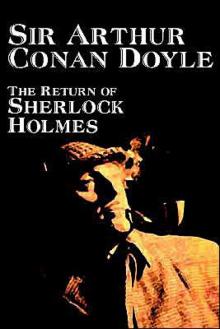 The Return of Sherlock Holmes (sherlock holmes)
The Return of Sherlock Holmes (sherlock holmes) The New Revelation
The New Revelation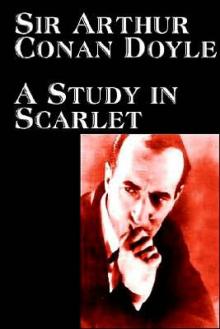 A Study in Scarlet (sherlock holmes)
A Study in Scarlet (sherlock holmes) The Vital Message
The Vital Message Sherlock Holmes Complete Collection
Sherlock Holmes Complete Collection Round the Red Lamp
Round the Red Lamp The Boscombe Valley Mystery
The Boscombe Valley Mystery The Adventure of the Beryl Coronet
The Adventure of the Beryl Coronet The Refugees
The Refugees The Adventure of the Three Students.
The Adventure of the Three Students.